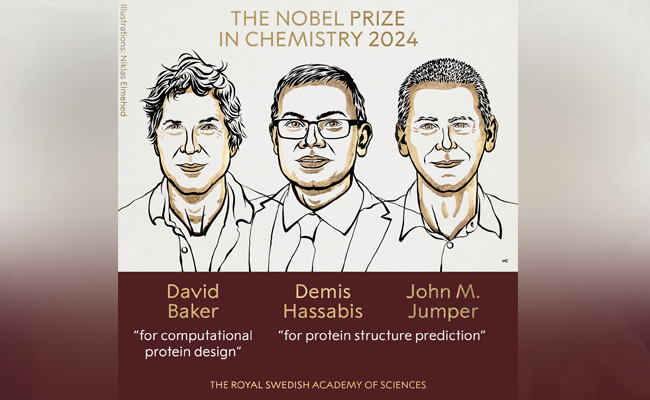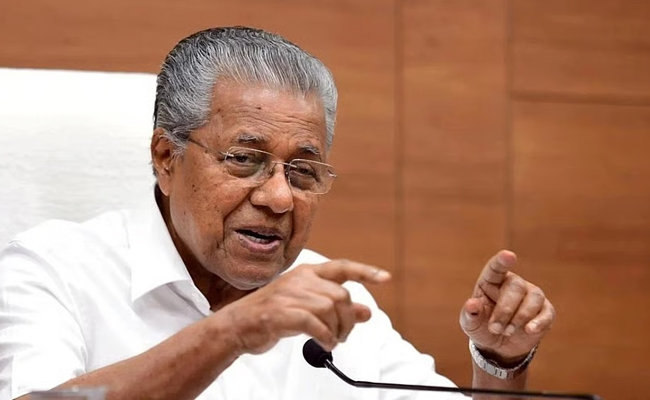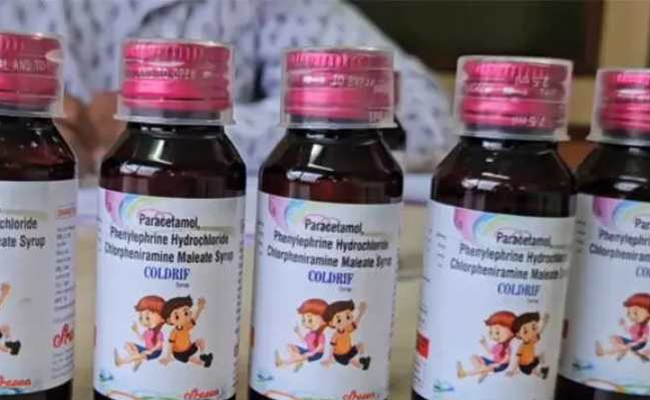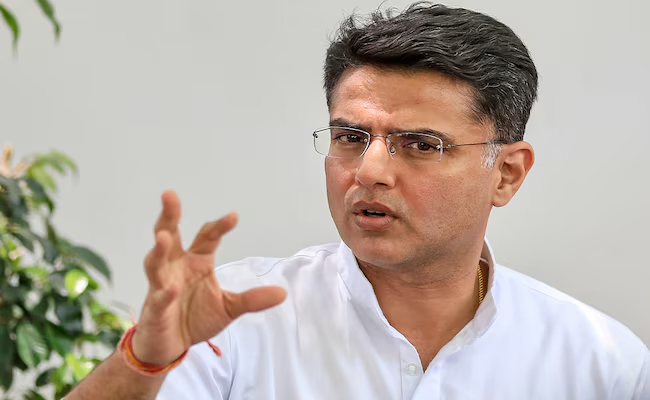Stockholm (AP): The Nobel Prize in chemistry was awarded Wednesday to David Baker, Demis Hassabis and John Jumper for their work with proteins.
Baker works at the University of Washington in Seattle, while Hassabis and Jumper both work at Google Deepmind in London.
Hans Ellegren, secretary general of the Royal Swedish Academy of Sciences that decides on the winner, announced the prize.
In 2003, Baker designed a new protein and since then, his research group has produced one imaginative protein creation after another, including proteins that can be used as pharmaceuticals, vaccines, nanomaterials and tiny sensors, the Nobel committee said.
Hassabis and Jumper created an artificial intelligence model that has been able to predict the structure of virtually all the 200 million proteins that researchers have identified, the committee added.
Last year, the chemistry award went to three scientists for their work on quantum dots — tiny particles just a few nanometres in diameter that can release very bright coloured light and whose applications in everyday life include electronics and medical imaging.
Six days of Nobel announcements opened Monday with Americans Victor Ambros and Gary Ruvkun winning the medicine prize. Two founding fathers of machine learning — John Hopfield and Geoffrey Hinton — won the physics prize.
The awards continue with the literature prize on Thursday. The Nobel Peace Prize will be announced Friday and the economics award on October 14.
The prize carries a cash award of 11 million Swedish kronor (USD 1 million) from a bequest left by the award's creator, Swedish inventor Alfred Nobel. The laureates are invited to receive their awards at ceremonies on December 10, the anniversary of Nobel's death.
Let the Truth be known. If you read VB and like VB, please be a VB Supporter and Help us deliver the Truth to one and all.
Thiruvananthapuram (PTI): The Kerala government on Monday assured stringent action in the mob lynching of a Chattisgarh native mistaken to be a thief, and promised justice to the family, even as the ruling CPI(M) targeted the RSS over the assault, a charge denied by the BJP.
Ramnarayan (31), was allegedly beaten to death on Wednesday after being accused of involvement in theft at Kizhakeattappallam near Walayar in Palakkad district.
With the issue sending shock waves across the state, Chief Minister Pinarayi Vijayan on Monday described the incident as "deeply disturbing".
Assuring justice to his family, who have arrived in the state, Vijayan said such acts tarnish the reputation of a progressive society like Kerala and are completely unacceptable.
State minister M B Rajesh claimed racial slurs were made at the victim and that the attackers were RSS workers. Ruling CPI (M) state secretary M V Govindan also alleged that RSS-BJP workers were behind the crime.
ALSO READ: After Hadi, another Bangladesh student leader shot in head
In a statement issued by the CM's office, Vijayan said strict action would be taken against those responsible for the crime.
A special investigation team of the district police is probing the incident, he said, adding that instructions have been issued to thoroughly examine the details of the case and initiate all necessary legal proceedings.
The government will also review the matter and ensure appropriate compensation to the victim's family, Vijayan added.
He called for collective vigilance to prevent the recurrence of such incidents in the future.
His remarks came a day after opposition Congress and the victim's family demanded compensation and an investigation under stringent laws, including the SC/ST (Prevention of Atrocities) Act.
The brother of deceased man told reporters on Sunday that the family would not accept the body until their demands, including compensation of Rs 25 lakh, are met.
Kerala ministers K Rajan and Rajesh strongly condemned the incident and said it was not just a mob lynching case but racial abuse was involved in it.
The ministers said the accused had attacked the deceased man, calling him a "Bangladeshi" and beat him to death.
"The government will ensure a foolproof probe into the incident, and no one involved in the crime will be spared," Revenue Minister Rajan told reporters in Thrissur.
He said an amount not less than Rs 10 lakh would be granted from the Chief Minister's Distress Relief Fund (CMDRF) to the deceased man's family and a cabinet meeting would take a decision in this regard.
LSGD Minister Rajesh also said Ramnarayan was branded as a Bangladeshi by the attackers.
While talking to reporters in Palakkad, he alleged that those who brutally assaulted and killed Ramnarayan were RSS workers.
The Chhattisgarh native, who reached Kerala in search of a job, became a victim of the "divisive politics" of Sangh Parivar, Rajesh further alleged.
"Branding a person as Bangladeshi came from racial politics. Ramnarayan was a victim of the racial poison spread by the Sangh Parivar in the country," he charged.
Rajesh also accused a section of the media of hiding the involvement of the RSS in the assault.
Stepping up the attack against the right-wing groups, CPI (M) state secretary M V Govindan alleged that RSS-BJP workers were the ones behind the crime.
"Those involved in the incident were accused in various criminal cases of RSS. All of them were identified. Such cruelties should not be allowed to repeat in the state," he said.
Expressing strong protest, the senior leader further said a society which believes in democratic values and secular principles cannot accept such crimes.
Senior BJP leader Kummanam Rajasekharan strongly rejected the charges against the saffron party and the RSS.
"Actually, why is politics mixed in such crimes. When a heinous crime like mob lynching happens, should it not be treated as an anti-social act," he told reporters here.
Leader of Opposition in the state Assembly, V D Satheesan urged the government to take urgent steps to provide financial assistance to the family of Ramnarayan.
Meanwhile, Palakkad Superintendent of Police Ajit Kumar said at present, the case was registered under sections of murder, and after a detailed probe, more would be added.
After verifying the caste certificate of the deceased man, SC/ST (Prevention of Atrocities) Act would also be invoked, he told reporters in Palakkad.
A 10-member Special Investigation Team (SIT) has been formed under the DSP (district crime branch) to probe the mob lynching incident. The SIT will be under the direction and supervision of the Pakakkad SP, he added.
ALSO READ: 17-year-old PUC student in Shivamogga drowns while swimming in River Tunga
When reporters asked about the political background of the accused persons, the officer said it was being verified.
He said that the arrested persons were already facing police cases.
Five people have been arrested so far for allegedly beating Ramnarayan to death on suspicion of theft.
The injured man was rushed to the Palakkad District Government Hospital, where he later succumbed to his injuries.





